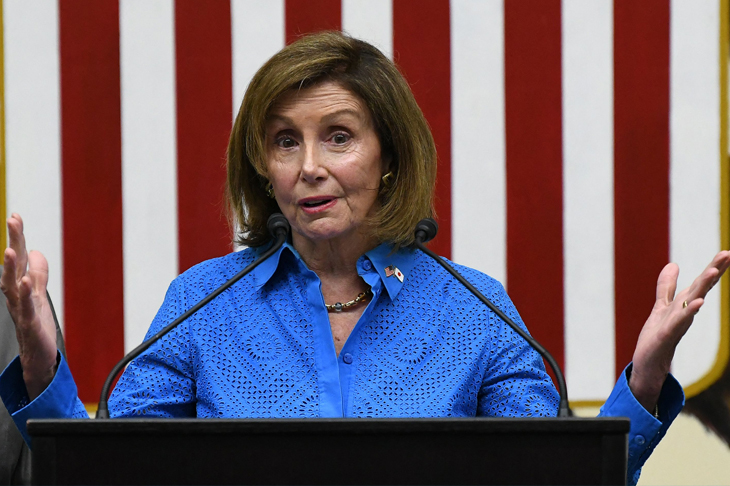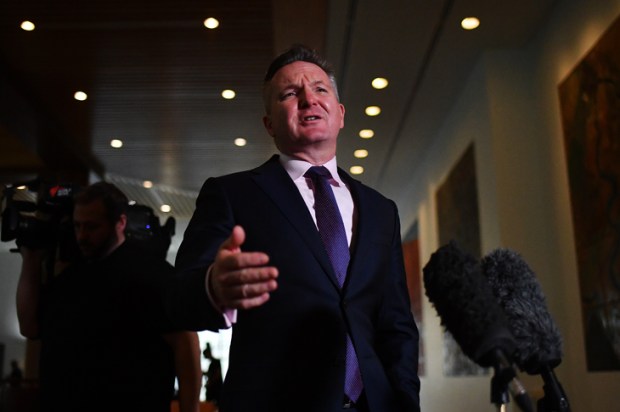I have a rule in life: whatever Kevin Rudd thinks, I think the opposite. It makes life simple. When the Ruddster declared that it was a mistake for Nancy Pelosi, leader of the House in the US Congress, to visit Taiwan, I immediately knew it was a good idea.
Actually, I’d figured that out even before the loquacious former prime minister expressed his opposite opinion. Good on Nancy for going, even if one of the motivations for her trip was to drum up donations for the floundering Democrat party back at home. (I had previously thought she may serve the world better by simply spending time with her multiple grandchildren and great-grandchildren.)
What I also hadn’t fully realised until recently was that no US leader of substance had visited Taiwan for a quarter of a century. Cowards, is all I can say.
One of the most useful outcomes of Nancy’s visit was the grumpy reaction of China and its declaration that its climate cooperation with the US would now cease. I know, I know: what climate cooperation? China’s idea of climate cooperation has been to cash in big time on the West’s suicidal commitment to net zero by 2050, pretending to do something domestically and all the while carrying on as they would have in any case.
With China suspending climate cooperation, those green-obsessed politicians and activists are robbed of the line that China, the largest emitter of greenhouse gases in the world, is taking climate action seriously and fully intends to meet net zero – just at a later date. Yeah, right.
Alternative narratives that downplay the need for a global effort are quickly being constructed, including the supposed economic benefits from redirecting investment dollars away from fossil fuels. Needless to say, it should still be all steam ahead – water vapour, obviously – for countries like the US and Australia in terms of imposing damaging restrictions on emissions.
The fact the UK and some European countries are having second thoughts about the whole net zero thing, particularly given astronomical energy prices and the prospect of fuel shortages in the coming winter, needs to be wilfully ignored. UK voters, in particular, are beginning to have their doubts – but who cares?
Getting back to the US, Nancy had to hot-foot it back to Washington, DC to deal with the misleadingly titled Inflation Reduction Bill that had passed through the Senate thanks to the bizarre decision of West Virginian Democrat senator, Joe Manchin. (Until now, he has been the sole Democrat senator who has stood against the full madness of the Democrats’ legislative plans. Senator Sinema from Arizona deserves an honourable mention.)
According to the Wall Street Journal, the title of this bill would actually make second-hand car salesmen blush. When does spending an additional $US400-plus billion lead to lower inflation? And as for the additional 87,000 Internal Revenue officers collecting more tax, the mind boggles.
This 700-page bill is actually a watered-down version of Biden’s Build Back Better bill that was floating around most of last year. This new edition still contains massive subsidies for renewable energy as well as ongoing tax credits for electric vehicles. (The federal credits were due to be phased out.) There is also some stuff included about cheaper medicine and extending Obamacare subsidies.
It’s a puzzle why Manchin would support this legislation given the harm it does to coal-mining and coal-power generation, both activities which are significant in West Virginia. It would appear that Manchin was persuaded because certain (uncertain) concessions were made in relation to environmental permitting which is about the regulatory approval processes that apply to pipelines, transmission lines and the like. Machin has been frustrated by the delay in commissioning a new natural-gas pipeline across his state.
Whether any real streamlining of these processes will occur remains highly uncertain. Environmental groups have made it part of their core business to thwart the development of fossil fuel-related infrastructure – think here Keystone XL Pipeline. The most likely outcome is that Manchin will turn out to have been naive in believing any changes will be made while the rest of the bill becomes law.
In the meantime, the performance of the electricity system in the US is showing signs of marked deterioration in those states that have separated generation, transmission and retailing – Enron come on down – as well as promoting renewable energy. Consumers are being hit with much higher prices and unreliability is becoming a common feature, particularly in California.
Weirdly, in Texas, problems with the electricity system are also acute as that conservative state goes long on renewables and fails to connect very much with other states. There is a steadfast refusal to implement a capacity mechanism to explicitly ensure reliable supply – this is a common feature of systems with high penetration of renewable energy – instead relying on peaking prices to induce adequate supply at all times (which it does not). And rather than protect households from the full brunt of fluctuations in the wholesale electricity prices, Texans must bear this burden, leading to very rapidly rising retail electricity prices in recent times.
What is becoming increasingly clear is that those states that stayed with the old-fashioned public utility model of single ownership of generation, transmission and retailing are faring much better in terms of reliability and lower prices. The organisations in charge place a high priority on planning and grid integrity which, in turn, is yielding benefits for those state residents.
The broader point is this: the US and other countries (including Australia) are increasingly inflicting economic injury and consumer harm by pursuing aggressive climate policies and subsidising renewable energy and electric vehicles while China is withdrawing its climate cooperation.
This is notwithstanding the fact that only global efforts to reduce emissions can affect the climate – well, that’s assuming even global efforts can. What is certain is that several countries reducing the growth of emissions while other large emitting countries go on their merry ways is pointless. We should be thankful to Nancy and her visit to Taiwan for making this very clear.
It’s also why we will increasingly hear the (false) argument from captured politicians that climate measures are really about generating economic opportunities and creating jobs. As Joe Biden declared in bumbling fashion: ‘the first thing I think about when I hear renewable energy is jobs’.
Oh, dear.
Got something to add? Join the discussion and comment below.
Get 10 issues for just $10
Subscribe to The Spectator Australia today for the next 10 magazine issues, plus full online access, for just $10.
You might disagree with half of it, but you’ll enjoy reading all of it. Try your first month for free, then just $2 a week for the remainder of your first year.














Comments
Don't miss out
Join the conversation with other Spectator Australia readers. Subscribe to leave a comment.
SUBSCRIBEAlready a subscriber? Log in